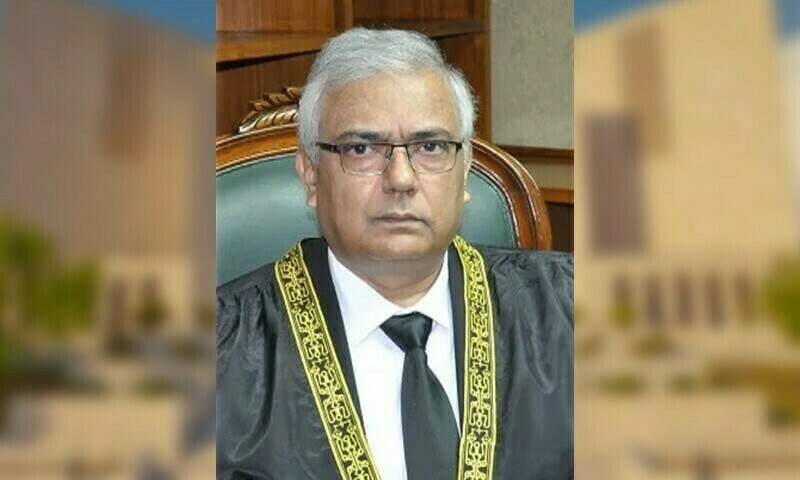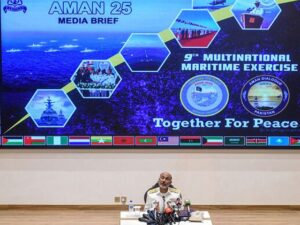Justice Aminuddin Khan — while hearing the case on the military trials of civilians on Tuesday — wondered how a trial for the same offence committed by a civilian and army personnel be held in different courts.
On December 13 last year, the constitutional bench conditionally allowed military courts to pronounce reserved verdicts of 85 civilians who were still in custody for their alleged involvement in the May 9 riots. On Dec 21, military courts sentenced 25 civilians to prison terms ranging from two to 10 years for their involvement in the riots. A week later, another 60 civilians were handed jail terms ranging from two to 10 years for their involvement in the riots.
The Supreme Court Constitutional Bench resumed hearing intra-court appeals (ICAs) challenging an October 23, 2023 ruling by a five-judge bench that had unanimously declared that trying the accused civilians in military courts violated the Constitution.
The seven-judge Constitutional Bench was headed by Justice Aminuddin Khan and included Justices Afghan, Jamal Khan Mandokhail, Muhammad Ali Mazhar, Musarrat Hilal, Shahid Bilal Hassan and Rizvi. The bench has questioned in recent hearings why the accused were “specifically” tried in military courts instead of anti-terrorism courts.
During the hearing today, Justice Mandokhail inquired whether anyone could be tried in a military court for a serious offence like terrorism.
Salman Akram Raja, the counsel for Arzam Junaid — sentenced to 6 years in jail in the May 9 Jinnah House attack case — claimed that a civilian couldn’t be tried in a military court “under any circumstances”.
In response, Justice Khan said a law could not be declared null and void because it was being misused, citing the misuse of the blasphemy act.
“If a soldier commits one crime and a common man commits the same crime, how can the trial be held in a separate place?” wondered Justice Khan.
Lawyer Raja said that people who gave up their fundamental rights by joining the army cannot be brought together with others.
In the hearing, Justice Mandokhail questioned what powers the military court had according to the Army Act.
“Can a person who is not part of the army be court-martialed only based on a crime?” he asked.
Raja case took the position that in the F.B. Ali case, it was said that the trial of civilians was possible only after fulfilling fundamental rights.
Justice Muhammad Ali Mazhar asked how FB Ali was court-martialed when he was a civilian himself.
Salman Akram Raja replied that the “court had declared that the provision of fundamental rights as necessary — that the fundamental rights were not violated in the trial in the FB Ali case”, underscoring Section 2-D(1) of the Army Act.
“It was said in the F.B. Ali case that the Army Act brought by the presidential ordinance was correct,” Raja said, adding that it was also stated that it could be reviewed under the said fundamental rights.
Justice Jamal Mandokhail questioned, “What was the definition of nexus in the F.B. Ali case?”
Raja said that the “incitement against the armed forces and the connection of the crime with the defence of Pakistan was the nexus”.
“Here the F.B. Ali case was read in such a way as to allow the setting up of a separate court,” he added.
On this occasion, Justice Aminuddin remarked that “you are presenting arguments against the central decision”.
Raja replied that Justice Ayesha Malik’s decision was also available.
Justice Muhammad Ali Mazhar wondered, “Why are the provisions of the Army Act declared null and void.”
Raja took the position that the “appeal is filed against the degree [of the court], not against the reasons”.
“The court can change the reasons while maintaining the operative part, the court continues to do this day by day,” he added.
Justice Mandokhail remarked that the ordinance came in 1968 under which the tehsildar was given the powers of the court and when the matter was challenged in the Azizullah Memon case, the apex court ended it.
“The process continued for fourteen years even after the 1973 constitution,” Justice Mandokhail said.
Raja said that when in 1987, Article 175, Clause 3 A came, the law was changed.
“If the court upholds Justice Ayesha Malik’s decision on Article 10A, then it is our victory,” he said.
Justice Mandokhail questioned whether section 2D in the Army Act existed anywhere in the world.
“I have done a lot of research and there is no such section anywhere in the world,” Raja replied.
Justice Mandokhail said that the civilian and the military personnel were both citizens of Pakistan.
Raja, in response, said that provisions related to civilians in the Army Act were for terrorists and the government was using these provisions for their opponents, adding that there were first information reports filed against him for the “murder of three Rangers personnel on November 26”.
“I may be arrested in the same case on February 7,” he said, adding that if the court restored these provisions, they would be used similarly.
- Desk Reporthttps://foresightmags.com/author/admin/











